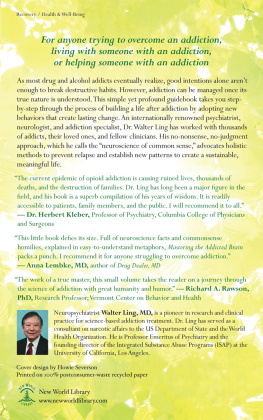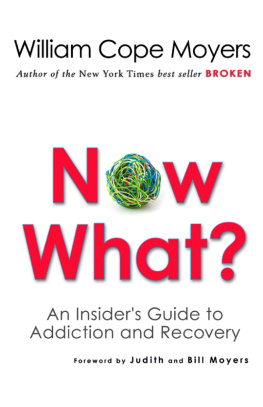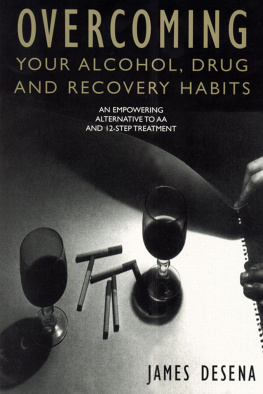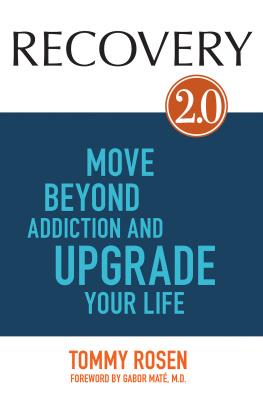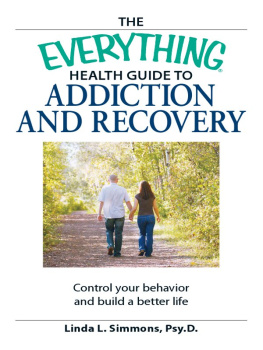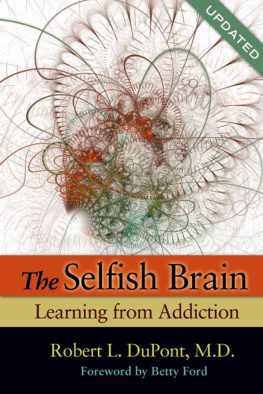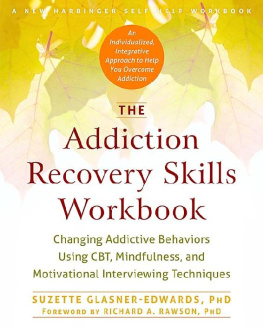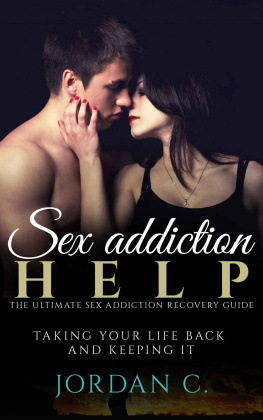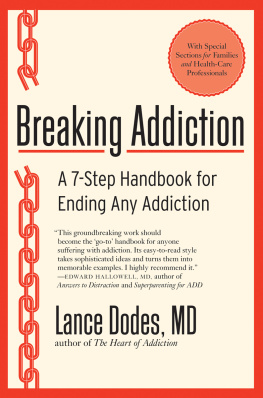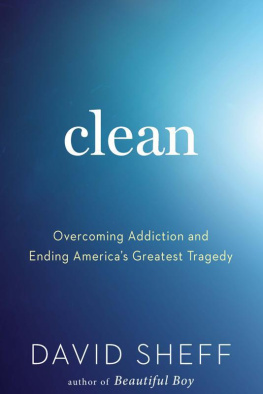
Board-certified both in neurology and in psychiatry by the American Board of Medical Specialties, Walter Ling, MD, is a neuropsychiatrist in the truest sense. For over five decades he has enjoyed a successful career in research and in clinical practice, consistently listed in the Best Doctors in America, Best Doctors in the West, and Best Doctors in Los Angeles. He has been a leader in developing science-based addiction treatment since the Vietnam War heroin epidemic, when President Richard Nixon established the White House Special Action Office for Drug Abuse Prevention, forerunner of the National Institute on Drug Abuse. His numerous clinical trials through the years have contributed pivotal data to the Food and Drug Administrations approval of all three currently available medications used in medication-assisted treatment methadone, buprenorphine, and naltrexone.
Acknowledged and respected nationally and internationally as a clinician, researcher, and teacher, Dr. Ling has served as consultant on narcotic affairs to the US Department of State, the World Health Organization, and the United Nations Office of Drug Control. For the last two decades, he led UCLAs Integrated Substance Abuse Programs, one of the foremost research and training organizations in drug abuse in the United States and worldwide, which has provided extensive drug abuse training to countries in Asia, Southeast Asia, and the Middle East. Dr. Ling is Professor Emeritus of Psychiatry at UCLA, and he lives in Los Angeles.

I have tried to synthesize what I have learned from my patients over the last five decades into an approach that I hope will be useful in your quest to overcome addiction. Many colleagues have contributed in one way or another to whats in this book, and I thank them for their insight and wisdom. My mentor Jim Klett taught me everything I know about research and systematic thinking. Alan Leshner, more than anyone else, championed addiction being a brain disease. Of my generation, those I worked with closely were Chris Chapleo, Jeanne Obert, Charles OKeefe, Rick Rawson, David Smith, Frank Vocci, and Don Wesson. Peggy Compton and Steve Shoptaw were my closest collaborators of the coming generation. I am pleased to say that most of us are still actively contributing to this field. The contents of this book including all errors of commission and omission, goofs, and snafus are, however, my responsibility. Ill be grateful if you, the reader, will tell your friends what you like about this book and tell me what you dont like.
Finally, I thank my longtime assistants, Sandy Dow and Brian Perrochet, for their untiring editorial assistance; my daughters, Pamela, Michelle, Deborah, and Kimberly, for their encouragement and confidence that the book was worth publishing, especially Michelle, who edited the final manuscript; Michelles husband, Kevin, who connected me to Georgia, my editor and publisher; and my wife, May, for putting up with me in so many different ways.
NEW WORLD LIBRARY is dedicated to publishing books and other media that inspire and challenge us to improve the quality of our lives and the world.
We are a socially and environmentally aware company. We recognize that we have an ethical responsibility to our customers, our staff members, and our planet.
We serve our customers by creating the finest publications possible on personal growth, creativity, spirituality, wellness, and other areas of emerging importance. We serve New World Library employees with generous benefits, significant profit sharing, and constant encouragement to pursue their most expansive dreams.
As a member of the Green Press Initiative, we print an increasing number of books with soy-based ink on 100 percent postconsumer-waste recycled paper. Also, we power our offices with solar energy and contribute to non-profit organizations working to make the world a better place for us all.
Our products are available in bookstores everywhere.
www.newworldlibrary.com
At NewWorldLibrary.com you can download our catalog, subscribe to our e-newsletter, read our blog, and link to authors websites, videos, and podcasts.
Find us on Facebook, follow us on Twitter, and watch us on YouTube.

Send your questions and comments our way!
You make it possible for us to do what we love to do.
Phone: 415-884-2100 or 800-972-6657
Catalog requests: Ext. 10 | Orders: Ext. 10 | Fax: 415-884-2199


Hardly a day goes by without some researcher, politician, or policymaker saying that, based on forty years of scientific research, addiction should be considered a chronic brain disease and treated like any other chronic disease. Patients should have more ready access to treatment, in line with whats offered for chronic illnesses like heart disease. While that is all well and good, is it true that brain disease is the same as other chronic diseases? What does having a brain disease really mean for people suffering from addiction, for their families and friends, and for their physicians? This is both a medical and a philosophical question, or to put it more accurately, this is where medicine and philosophy come together.
The Framework of Brain Disease
Nearly two thousand years ago, the Greek physician and philosopher Galen observed that people with brain disease behave differently than those suffering from diseases of other body organs. He saw that when disease affects the brain, not just one certain body part stops working properly, but the whole person is affected. While a diseased body organ can make you very sick, people still recognize you as the person you are. Brain disease, however, affects the whole person your sense of being a person, your personality, and your personhood. You are no longer the person you once were, and you are not the person your family and your friends once knew. People dont recognize who the addicted person has become, and sometimes addicts dont even recognize themselves.
When leaders and policymakers say we should treat addiction the way we treat hypertension, diabetes, and heart diseases, they are mainly arguing that doctors should treat addicted patients in the same way as patients with other chronic diseases, and health insurance should provide similar coverage. As a matter of policy, this is fine. However, it misses the mark to regard diseases of addiction as similar to other diseases. Brain disease affects much more than the body. Our brains define us in symbolic, metaphysical, moral, and spiritual ways. The brain is the organ of relationships, and its disease affects our relationship with our family, society, and God, not to mention ourselves. It is what makes us who we are.
That is why I want to explain what drugs do to the brain, what happens to the brain on its way to becoming addicted and staying addicted, why people cannot just stop taking drugs when they want to, and why people take drugs to begin with. I want you to fully appreciate addiction as a brain disease.
That said, please remember that describing addiction as a disease of the brain is only a framework. A framework is not necessarily perfect or 100 percent accurate, and it doesnt have to be. We use frameworks to help us solve a problem in the most effective way, and I believe this framework for addiction does that. In time, as we understand addiction better, we may modify or even replace this framework, but only because a new framework works better at healing addiction.
Next page
